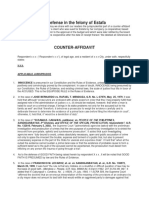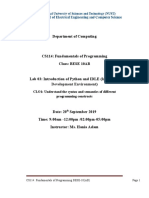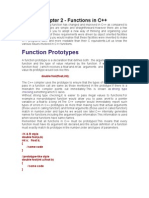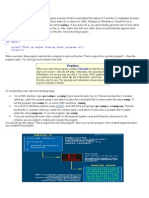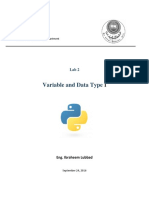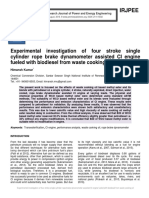0 ratings0% found this document useful (0 votes)
24 views38 JoP Feb 10
38 JoP Feb 10
Uploaded by
anujvermamnitThe document discusses increment and decrement operators (++ and --) in the C programming language. It provides examples of how these operators work, including in expressions like a++b and a++++b. It notes that the ++ and -- operators were among the first features introduced in C to generate more compact code than adding or subtracting 1 from a variable. The operators remain useful today for their brevity. The document also discusses how the "maximum munch" rule applies to these operators during lexical analysis of C code.
Copyright:
Attribution Non-Commercial (BY-NC)
Available Formats
Download as PDF, TXT or read online from Scribd
38 JoP Feb 10
38 JoP Feb 10
Uploaded by
anujvermamnit0 ratings0% found this document useful (0 votes)
24 views1 pageThe document discusses increment and decrement operators (++ and --) in the C programming language. It provides examples of how these operators work, including in expressions like a++b and a++++b. It notes that the ++ and -- operators were among the first features introduced in C to generate more compact code than adding or subtracting 1 from a variable. The operators remain useful today for their brevity. The document also discusses how the "maximum munch" rule applies to these operators during lexical analysis of C code.
Original Title
38-JoP-Feb-10
Copyright
© Attribution Non-Commercial (BY-NC)
Available Formats
PDF, TXT or read online from Scribd
Share this document
Did you find this document useful?
Is this content inappropriate?
The document discusses increment and decrement operators (++ and --) in the C programming language. It provides examples of how these operators work, including in expressions like a++b and a++++b. It notes that the ++ and -- operators were among the first features introduced in C to generate more compact code than adding or subtracting 1 from a variable. The operators remain useful today for their brevity. The document also discusses how the "maximum munch" rule applies to these operators during lexical analysis of C code.
Copyright:
Attribution Non-Commercial (BY-NC)
Available Formats
Download as PDF, TXT or read online from Scribd
Download as pdf or txt
0 ratings0% found this document useful (0 votes)
24 views1 page38 JoP Feb 10
38 JoP Feb 10
Uploaded by
anujvermamnitThe document discusses increment and decrement operators (++ and --) in the C programming language. It provides examples of how these operators work, including in expressions like a++b and a++++b. It notes that the ++ and -- operators were among the first features introduced in C to generate more compact code than adding or subtracting 1 from a variable. The operators remain useful today for their brevity. The document also discusses how the "maximum munch" rule applies to these operators during lexical analysis of C code.
Copyright:
Attribution Non-Commercial (BY-NC)
Available Formats
Download as PDF, TXT or read online from Scribd
Download as pdf or txt
You are on page 1of 1
_____________________________________________ Guest Column | The Joy of Programming
S.G. Ganesh
Understanding Increment and
Decrement Operators in C
Almost all programmers who work in C-based languages use the ++ and -- operators.
Let’s look at some interesting aspects of these operators in C.
I ncrement/decrement operators are good examples
to explain the curt (concise) syntax of C language:
(a), PLUS (+), VARIABLE(B) as output, which is a valid
sequence of tokens for compilation to succeed.
Now, how about the expression a++b? It is treated as
void strcpy(char *t, const char *s) { a ++ b, and not (a + (+b)), and results in a compiler error.
while(*t++ = *s++); How about a+++b? It becomes ((a++) + b), so it’s fine.
} Expression a++++b? It is ((a++) (++b)), so it is a compiler
error. Hmm, how about a++++b? It is ((a++) ++) (+b)),
In this strcpy function, the while loop continues which is again a compiler error. Note that, in all these
copying chars from source to target, till it reaches the end cases, if we use explicit white-space or parenthesis, we
of the string ('\0' character). can get valid expressions: (a+ (+b)), ((a++) + b), ((a++)
Here is another example; can you guess the output of + (+b)), and ((a++) + (++b)). If we try adding more +s
this code segment? after this, we cannot get a valid expression for integer
arguments (but we might get valid ones in case of
char str[] = “oh”, *p = str; pointers, for example).
while (*p) Today, C-based languages (C++, Java, etc) rule
++*p++; the programming world; because of this, almost all
printf(str); programmers are aware of the ++ and -- operators,
and how powerful they are in expressing operations.
How is the expression ++*p++ treated? The postfix What even experienced programmers do not know is
increment/decrement is part of the operators with that the C family was the first to introduce the ++ and
highest precedence; the dereference and prefix -- operators! Ken Thompson, while implementing the B
increment/decrement is at the next precedence level compiler, noticed that increment operations generate
and their associativity is from right to left. So, the more compact code than adding 1 to a variable and
expression is treated as: (++(*(p++))). p is a pointer to storing it back. In other words, an increment was
string “oh”. In the while loop, p++ is executed first, but one instruction while adding 1 and storing it back
its effect doesn't take place till the statement execution was more than one instruction. So he implemented
completes. The result of p++ (which is still the value of the prefix ++ (and --) operators, and generalised it by
p) is dereferenced with *. For the first character it is 'o'. adding a postfix version. Interestingly, this short code-
Now, prefix ++ increments the character value, so its generation advantage is still true for recent languages.
value is 'p'. The same happens for the next character, For example, in Java, integer increment would generate
'h', which becomes 'i'. Now the end of the character is one instruction (iinc) compared to the four instructions
reached, so the while loop terminates. The printf now for adding 1 to the variable and storing it back (iload_x,
prints the modified string, which is “pi”. iconst_1, iadd and istore_x instructions)!
We can use ++/-- operators to illustrate the
'maximum munch' rule in C lexical analysis. Simply About the author:
stated, the lexical analyser (lexer) looks for a match for S G Ganesh is a research engineer in Siemens (Corporate
Technology). His latest book is ‘Cracking the C, C++ and Java
the longest token. For example, consider the expression
Interview’, published by Tata McGraw-Hill. You can reach him at
a+b, where a and b are integer variables. Given this as sgganesh@gmail.com.
input in a C program, the lexer might give VARIABLE
www.LinuxForU.com | LINUX For You | FEBRUARY 2010 | 13
You might also like
- Cs50 Harvard Edu Extension 2019 Spring Weeks 1-8 Compiled NotesDocument121 pagesCs50 Harvard Edu Extension 2019 Spring Weeks 1-8 Compiled NotesAngad PablayNo ratings yet
- Law - Estafa Defense - Good Faith As A Defense in The Felony of EstafaDocument5 pagesLaw - Estafa Defense - Good Faith As A Defense in The Felony of EstafaNardz Andanan100% (4)
- C++ For Python Programmers: Purpose of This DocumentDocument13 pagesC++ For Python Programmers: Purpose of This DocumentShivam PundirNo ratings yet
- Lab 3 - Introduction of Python and IDLEDocument13 pagesLab 3 - Introduction of Python and IDLEWaseem AbbasNo ratings yet
- Questions of Decode CDocument7 pagesQuestions of Decode CKawshal ChhetriNo ratings yet
- Chap 2 Functions in C++Document9 pagesChap 2 Functions in C++Priyanka ShettyNo ratings yet
- Myths FinalDocument23 pagesMyths FinalAlex MuscarNo ratings yet
- Intro To C - Module 2Document9 pagesIntro To C - Module 2Andrew FuNo ratings yet
- C++ NotesDocument191 pagesC++ NotesJjeerryyy NikharNo ratings yet
- Unbounded Spigot Algorithms For The Digits of Pi (Gibbons)Document11 pagesUnbounded Spigot Algorithms For The Digits of Pi (Gibbons)gouluNo ratings yet
- Notes FortranDocument65 pagesNotes Fortrangaozhe jiangNo ratings yet
- Travelling Salesman ProblemDocument19 pagesTravelling Salesman ProblemMonica karthikeyavelavanNo ratings yet
- Basic C LanguageDocument73 pagesBasic C LanguagekeshavNo ratings yet
- CDocument49 pagesCahmad100% (6)
- Module 1Document11 pagesModule 1cabella_pasaporteNo ratings yet
- Chapter 7 Expressions and Assignment StatementsDocument11 pagesChapter 7 Expressions and Assignment StatementsPeter KongNo ratings yet
- History of C++ (C With Classes)Document30 pagesHistory of C++ (C With Classes)jazz vergsNo ratings yet
- Olha AiDocument9 pagesOlha Aibadapple007No ratings yet
- C++ LanguageDocument196 pagesC++ LanguagePardeep Vats100% (1)
- Chapter 2Document44 pagesChapter 2Nur TraNo ratings yet
- How C WorksDocument47 pagesHow C WorksPuneet AtwalNo ratings yet
- Lab Manual 6 Implemenation of A Program To Convert A Given Infix Expression To Postfix Form Using StacksDocument3 pagesLab Manual 6 Implemenation of A Program To Convert A Given Infix Expression To Postfix Form Using Stackspareshdeore.skillNo ratings yet
- Assuming That You Are Using A Turbo C or Turbo C++ Compiler Here Are The Steps That You Need To Follow To Compile and Execute Your First C ProgramDocument2 pagesAssuming That You Are Using A Turbo C or Turbo C++ Compiler Here Are The Steps That You Need To Follow To Compile and Execute Your First C ProgramChinmayaTeellaNo ratings yet
- Get Fast C++ Assignment HelpDocument14 pagesGet Fast C++ Assignment HelpCpp Homework Help100% (1)
- FCHGCDocument13 pagesFCHGCEliot KhNo ratings yet
- What Is C++?Document6 pagesWhat Is C++?Fred Austin H. FabrigarNo ratings yet
- X++, C# ComparisonDocument33 pagesX++, C# ComparisonKashyap Patel100% (1)
- C Programming - OperatorsDocument8 pagesC Programming - OperatorsR-jayVenturilloNo ratings yet
- Constants: Printing Out and Inputting VariablesDocument7 pagesConstants: Printing Out and Inputting VariablesAnurag SarkarNo ratings yet
- CPP Sci CompDocument320 pagesCPP Sci CompAkbar AliNo ratings yet
- C BasicsDocument13 pagesC Basicskarurmohan15No ratings yet
- Kajal - C FileDocument17 pagesKajal - C File4915 KajalNo ratings yet
- C ProgrammingDocument13 pagesC Programmingmariano.socmed.santosNo ratings yet
- 1000 MEQs - Programming & Graphics 100Document207 pages1000 MEQs - Programming & Graphics 100Dutta Computer AcademyNo ratings yet
- M5-MAINDocument66 pagesM5-MAINcaliburnrosewoodNo ratings yet
- Mention The Different Storage Classes in C.: There Are Two Storage Classes: Automatic and StaticDocument17 pagesMention The Different Storage Classes in C.: There Are Two Storage Classes: Automatic and StaticRamesh PalaganiNo ratings yet
- C++ NotesDocument116 pagesC++ Notessourabh patelNo ratings yet
- Infix2Postfix PDFDocument3 pagesInfix2Postfix PDFNam Trần XuânNo ratings yet
- Introduction To C++ ProgrammingDocument21 pagesIntroduction To C++ ProgrammingMuhudin Mohammed SemanNo ratings yet
- Functional Programming in C Code ProjectDocument14 pagesFunctional Programming in C Code ProjectAlma KrivdicNo ratings yet
- Lab 2 Variable and Data Type IDocument9 pagesLab 2 Variable and Data Type IDeepak MalusareNo ratings yet
- C Lab Worksheet 5 - 2 C/C++ Variable, Operator and Type 3: // Needed For PrintfDocument7 pagesC Lab Worksheet 5 - 2 C/C++ Variable, Operator and Type 3: // Needed For Printfsalma_1No ratings yet
- CHAPTER-2: Elements of Computer Programing-1Document13 pagesCHAPTER-2: Elements of Computer Programing-1vyom00No ratings yet
- ASSIGNMENT C++ ProgrammingDocument8 pagesASSIGNMENT C++ ProgrammingNadRawkNo ratings yet
- C Interview Questions: Q1) - What Is C Programming Language?Document58 pagesC Interview Questions: Q1) - What Is C Programming Language?dhana raj nakkaNo ratings yet
- Data, Operators, IODocument19 pagesData, Operators, IOVictor HernandoNo ratings yet
- C Programming: by Deepak Majeti M-Tech CSE Mdeepak@iitk - Ac.inDocument19 pagesC Programming: by Deepak Majeti M-Tech CSE Mdeepak@iitk - Ac.inviswakshaNo ratings yet
- Coding WordProblems Ch1 to Ch6 (1)Document33 pagesCoding WordProblems Ch1 to Ch6 (1)mua347175No ratings yet
- CS 106B: Getting Started in C++: Most Programs Have The Same Component SectionsDocument6 pagesCS 106B: Getting Started in C++: Most Programs Have The Same Component SectionsIrene HsuNo ratings yet
- A Tutorial Introduction To The Language B: B. W. Kernighan Bell Laboratories Murray Hill, New JerseyDocument17 pagesA Tutorial Introduction To The Language B: B. W. Kernighan Bell Laboratories Murray Hill, New JerseyQuyền NguyễnNo ratings yet
- CS3157: Advanced Programming: Lecture #6 June 14Document75 pagesCS3157: Advanced Programming: Lecture #6 June 14Deepak KumarNo ratings yet
- C BasicsDocument22 pagesC BasicsSupriya Namdeo ManchekarNo ratings yet
- C Interview questionsDocument5 pagesC Interview questionsPriya jhaNo ratings yet
- C Programming:: Numerals: 0, 1, 2, 3, 4, 5, 6, 7, 8, 9 Alphabets: A, B, .ZDocument13 pagesC Programming:: Numerals: 0, 1, 2, 3, 4, 5, 6, 7, 8, 9 Alphabets: A, B, .ZbhavanatiwariNo ratings yet
- ME 172 - Lecture2Document30 pagesME 172 - Lecture2Mohammad Asif KabirNo ratings yet
- PROGRAMMING WITH PYTHON: Master the Basics and Beyond with Hands-On Projects and Expert Guidance (2024 Guide for Beginners)From EverandPROGRAMMING WITH PYTHON: Master the Basics and Beyond with Hands-On Projects and Expert Guidance (2024 Guide for Beginners)No ratings yet
- UNIX Shell Programming Interview Questions You'll Most Likely Be AskedFrom EverandUNIX Shell Programming Interview Questions You'll Most Likely Be AskedNo ratings yet
- What Is WepLabDocument3 pagesWhat Is WepLabMarcelo GomesNo ratings yet
- Question Bank-Sustainable Development NP307Document9 pagesQuestion Bank-Sustainable Development NP307Marina SherifNo ratings yet
- CSS-78 - Q0 Las7 FinalDocument7 pagesCSS-78 - Q0 Las7 FinalAry AlisboNo ratings yet
- Mus121 Syllabus Fall 2023 200V-201VDocument8 pagesMus121 Syllabus Fall 2023 200V-201Vsrh64280No ratings yet
- YTWL - CA100F Ethiopia Standard GPS Speed Limiter User Manual 122020Document24 pagesYTWL - CA100F Ethiopia Standard GPS Speed Limiter User Manual 122020zelalemNo ratings yet
- Brochr AS350B3eDocument16 pagesBrochr AS350B3eakar64100% (1)
- 45 Skid PDFDocument10 pages45 Skid PDFOmar AlsorakhiNo ratings yet
- Main NotesDocument227 pagesMain NotesNguyễn Minh HiếuNo ratings yet
- Experimental Investigation of Four Stroke Single Cylinder Rope Brake Dynamometer Assisted CI Engine Fueled With Biodiesel From Waste Cooking OilDocument8 pagesExperimental Investigation of Four Stroke Single Cylinder Rope Brake Dynamometer Assisted CI Engine Fueled With Biodiesel From Waste Cooking OilPremier PublishersNo ratings yet
- Elptp 20B - Elptp (Online) Sops For Candidates - 23 May 2021Document6 pagesElptp 20B - Elptp (Online) Sops For Candidates - 23 May 2021asdflskdneNo ratings yet
- CSC MagazineDocument21 pagesCSC MagazineSudhansu BeheraNo ratings yet
- Outline and Explain TWO Ethical Issues That Sociologists Using Primary Quantitative Methods Would - StudocuDocument1 pageOutline and Explain TWO Ethical Issues That Sociologists Using Primary Quantitative Methods Would - Studocusiennajaslee08No ratings yet
- Iec 62552 1 2015 Amd1 2020Document15 pagesIec 62552 1 2015 Amd1 2020stefancuandreiNo ratings yet
- Burtonsville Crossroads: Master Plan ReviewDocument13 pagesBurtonsville Crossroads: Master Plan ReviewPlanning DocsNo ratings yet
- AnjanaDocument1 pageAnjanaArun KumarNo ratings yet
- VR Hardware and Software TechnologiesDocument44 pagesVR Hardware and Software TechnologiesSiddharth GuptaNo ratings yet
- Project On Mutual FundDocument109 pagesProject On Mutual FundPrajwal AlvaNo ratings yet
- Android Unit 3Document251 pagesAndroid Unit 3Rafae DhopawakarNo ratings yet
- Ces Presentation 2Document40 pagesCes Presentation 2zmtvvaNo ratings yet
- Analytical Chemistry Lecture 3Document37 pagesAnalytical Chemistry Lecture 3S JNo ratings yet
- LH Assay InsertDocument8 pagesLH Assay InsertYogaswara AdiputroNo ratings yet
- Agrarian Reform FinalsDocument19 pagesAgrarian Reform Finalsafu'og kaH4No ratings yet
- CMPE105-Introduction To Computers and Information Systems M.Eryılmaz 2022.pdf1Document4 pagesCMPE105-Introduction To Computers and Information Systems M.Eryılmaz 2022.pdf1mohammadhoseinzeinaliNo ratings yet
- 2020 - Final Project - Case Study 2Document3 pages2020 - Final Project - Case Study 2RaihanAbdurrahman0% (1)
- Tableof BenefitsDocument7 pagesTableof Benefitsahmad abu sharkhNo ratings yet
- Csi3021 Advanced-computer-Architecture TH 1.0 66 Csi3021 61 AcpDocument2 pagesCsi3021 Advanced-computer-Architecture TH 1.0 66 Csi3021 61 AcpakkichettygreeshmaNo ratings yet
- EK280Document4 pagesEK280mmilovanmNo ratings yet
- Course Pack Soil Laboratory ExperimentDocument124 pagesCourse Pack Soil Laboratory Experimentkrazeecoolguy100% (1)
- Power Supplies and UPSDocument88 pagesPower Supplies and UPSsannynhNo ratings yet

